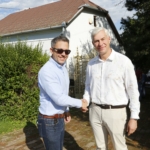The internet is the new utility service – what do the little ones know that the big ones don’t?
Internet access has become as important as water, gas or electricity in recent years, without it most households, businesses and companies cannot function. Thinking back to the pandemic situation of a few years ago, when many people’s lives were dominated by the home office and digital education, and employers, employees and students alike expected the same quality of computer-based work as they would have had from workplaces and schools with excellent internet infrastructures. Although the pandemic is behind us, the question remains: how to choose an internet service provider? We spoke to Gabriella Vér, Customer Relations Manager at VANNET Telecommunications Ltd., which has more than 2,000 customers, about the benefits of signing up with a smaller domestic provider.
– There are many questions to ask regarding choosing a new internet service provider: does it offer a full range of services, can it keep up with technological developments, i.e. will I get a state-of-the-art service, and perhaps most importantly, can I trust it? I think not the size of the provider determines who you choose, but the quality of the service. For example, although we are an SME, VANNET’s portfolio includes all telecom technologies: optic fibre, microwave, satellite and mobile internet. By combining these, we are able to offer high availability and solutions to our customers all over the country. We are also able to respond to needs that a multinational company cannot because it is not worth it. But there are also big players behind the small ones, sometimes we can provide a service through our partner network, for example, our satellite service with an international background, which guarantees quality.
– How can you build trust with potential customers?
– The largest solar farm in Eastern Europe and major manufacturing companies are among our customers, which in itself should inspire confidence in our future partners. Personal contact is essential, and in addition to the coverage and bandwidth requirements of internet services, the need for personalisation, flexible customer treatment and dedicated personal contact has been strongly felt by domestic businesses. I consider personal contact management to be important and a great advantage over the ever-increasing use of robotic customer management. I believe that the battle for customers is decided on details as early as the first conversation – be it a face-to-face meeting or a phone call, during which the relationship of trust is built, which is why the customer ultimately decides in our favour.
Our staff are constantly trained to have an in-depth knowledge of our entire portfolio to find the best solution for the specific need without any problems. We provide regular training on client-friendliness, with an emphasis on providing our colleagues with ”protected time” with their mentor to talk through cases that require more time, patience or complex solutions – to make our client relationship, and therefore our service, more engaging.
To deliver a tangible customer experience, we need to know all our subscribers’ needs, which are managed from the start by a personal contact. So we are not primarily a technology provider, but a solution provider. It says a lot about us that we have a customer retention rate of over 90%, which can also increase trust in our company.
– With smaller service providers, a potential client may be concerned about whether they can offer a full service, or whether they need to contract with multiple providers.
– To broaden our portfolio, continuous development is essential. VANNET has been on the market for 14 years, our first product was satellite internet service, which at that time was not available to residential or business internet users. However, as soon as we were able to do this, our customer base grew steadily, and with it came the need to develop. The modernisation of technology and customer demand is also “forcing” us to offer new services, but this is a condition for staying in the market. To ensure that we can develop nationally and widely, we are doing so partly through our own developments and partly by linking and using our strategic partner networks. With this operating model, as a “likeable”, customer-friendly service provider and small company, we are able to offer solutions to all incoming requests.
(The article was originally published in Dél-Dunántúli Gazdaság.)







